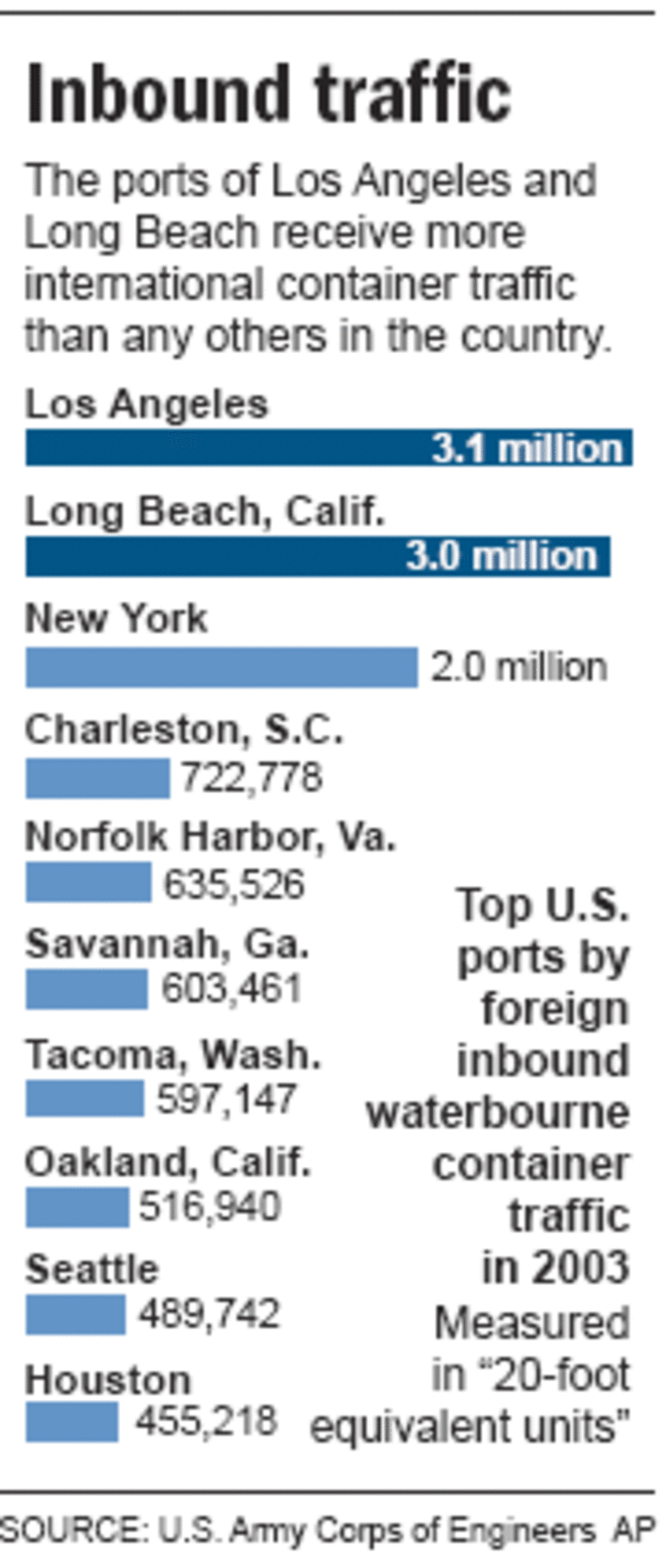Some days, Wilfredo Jimenez logs almost as much time sitting in his blue tractor-trailer watching TV as he does on the road hauling cargo from the busiest port complex in the United States.
But the longer he's forced to wait his turn to pass through the procedural gantlet at the ports of Los Angeles and Long Beach, the less money he stands to make.
The delays, which Jimenez says sometimes can drag on for several hours, cut into the port truckers' ability to earn money, because drivers get paid for every load they move, not for every hour they work, like other port employees.
A new program at the twin ports to expand the hours during which truck drivers can retrieve cargo was supposed to ease such delays, but Jimenez says he's seen little improvement.
"The day before last, I was delayed from 6 p.m. until 10 p.m. to take out one load," said Jimenez, 30, while waiting to make a pickup during an evening shift last week. "How is it possible that one has to wait so long when this new system was supposed to make the system better?"

The ports' expanded hours program, dubbed OffPeak, was designed to help lessen drivers' wait times inside the ports and ease traffic congestion on nearby highways by giving shippers a financial incentive to move their cargo during evening and weekend hours when there are fewer vehicles on the roads. The port complex now handles 40 percent of all the cargo shipped into the United States and 80 percent of U.S. imports from Asia.
In the first three weeks since its launch July 23, roughly 30 percent of the cargo containers hauled through the ports were moved during evening or weekend off-peak hours, according to data released by PierPASS Inc., which administers the program.
The ports already moved about 10 percent of their cargo in the evenings before the program and some terminals kept their gates open into the night to move cargo bound for rail.
Still, while the increase has been generally regarded as a sign the program is working, the persistent delays at some marine terminals could threaten the success of the ambitious initiative, said Robin Lanier, executive director of the Waterfront Coalition, a Washington D.C.-based trade group that represents retailers, manufacturers and other cargo importers and exporters.
Lanier said truck drivers have complained about delays during the evening shifts coinciding with whenever longshoremen take scheduled breaks.
"If they can't resolve the productivity issue within the terminals," Lanier said, "then the long-term success of the program could be in jeopardy."
The drivers who work the Los Angeles-area ports typically own their trucks but often lease them to the trucking companies they work for. They must pay for their own fuel costs, which have hit drivers particularly hard this year. The average price of diesel fuel at the pump in California last week was $3.04 a gallon, 92 cents higher than a year ago, according to U.S. Department of Energy.
Many drivers blame delays on the port longshore workers who, drivers say, have little incentive to work faster because they get paid more if they work at night and get to take regular breaks.
"Since they get paid by the hour, they always take their time, so the ones who don't make money are the drivers," said Elizandro Menendez, a driver from Los Angeles. He typically gets to complete two pickup and delivery trips per day.
"I've been working the ports since 1985 and it's always been the same problem," he said.
Truck driver Mario Aguilar, 55, said he's refused to work evening shifts because his company does not pay extra for working nights. While he's seen fewer trucks on the highways since OffPeak began, Aguilar said the program has had little effect on delays inside the terminals during the day.
"The terminals are very slow; the people over there are lazy," Aguilar said. "Sometimes we have to wait in line for two hours just to drop an empty (container) and to pick it up and load it, another hour and a half."
Bruce Wargo, the president and chief executive of PierPASS, acknowledged drivers' turn times — or the time it takes for a driver to pick up a container, deliver it and return to the ports — could be better, but stressed the program has only been up and running a fee weeks.
"We expect that to improve over time," Wargo said.
He noted that the amount of cargo being moved during evening hours shows early concerns by some truck companies — that drivers would not being willing to work evenings — never materialized.
PierPASS officials have also had to contend with some glitches and customer confusion with the system set up to track and collect the $40 to $80 fees per container charged to cargo owners for moving their goods during peak hours.
Some 9,100 companies have registered for PierPASS to date, Wargo said.
The expanded port hours have resulted in noticeably fewer trucks traveling on the highways near the ports in the morning, said state Sen. Alan Lowenthal.
"It seems to be exceeding its expectation in terms of the amount of cargo they're diverting to off-peak hours," said Lowenthal.
OffPeak's true test may be yet to come, however.
So far, cargo levels at the ports are lagging what they were last year at this time, the traditional start of the peak cargo shipping season.
In the first seven months of the year, the ports saw 200 fewer container ships than in the same period last year, when an influx of Asian imports combined with a shortage of trained dockworkers to create a logjam at the ports, said Capt. Manny Aschemeyer of the Marine Exchange, which tracks ship movements at the ports.
As early as June last year, ships often were forced to wait at sea before they could enter the port because of delays working the ships.
Now, most cargo container ships are able to dock as soon as they arrive, Aschemeyer said.
